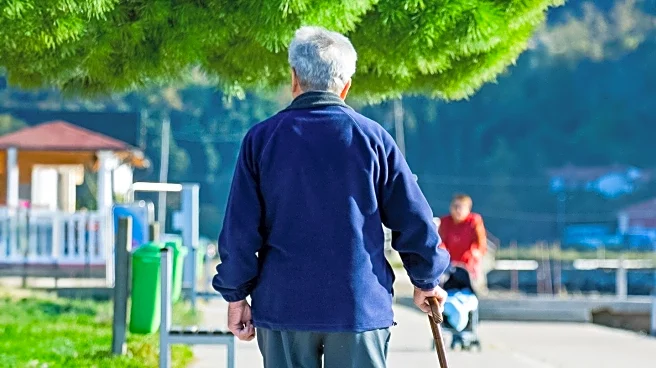What's Happening?
Dr. Peter Attia, a longevity expert, discusses strategies to prevent the common health decline experienced by individuals in their 70s. Attia, who runs a medical practice in Austin, Texas, emphasizes the importance of maintaining fitness, strength, and
mobility as people age. He recommends a mix of fat-burning cardio, high-intensity intervals, and strength training to maintain muscle mass. Attia also highlights the significance of VO2 max, a measure of cardiorespiratory fitness, as a predictor of lifespan. He advocates for full-body MRI scans to detect conditions early and suggests genetic testing for APOE, a gene linked to Alzheimer's risk. Attia stresses the importance of emotional and mental health alongside physical health.
Why It's Important?
Attia's approach to aging focuses on 'healthspan,' the period of life free from age-associated maladies. By prioritizing fitness and emotional well-being, individuals can extend their healthspan and improve their quality of life in later years. Attia's recommendations challenge traditional health markers, suggesting that fitness and strength are more predictive of longevity than factors like cholesterol and blood pressure. This perspective encourages a holistic approach to aging, where physical, emotional, and social health are interconnected.
What's Next?
Attia's strategies for aging well include regular exercise, monitoring VO2 max, and maintaining strong social connections. He encourages individuals to approach life like athletes, focusing on fitness and mobility. Attia's recommendations may influence healthcare practices, promoting a shift towards preventive measures and personalized health strategies. As awareness of the importance of healthspan grows, individuals may adopt lifestyle changes to enhance their longevity and well-being.
Beyond the Headlines
Attia's emphasis on emotional health highlights the role of social connections and supportive communities in aging well. This approach aligns with research on 'super agers,' who maintain cognitive and physical health through strong social networks. The integration of emotional and physical health in aging strategies reflects a broader understanding of well-being, where relationships and community play a crucial role.
















